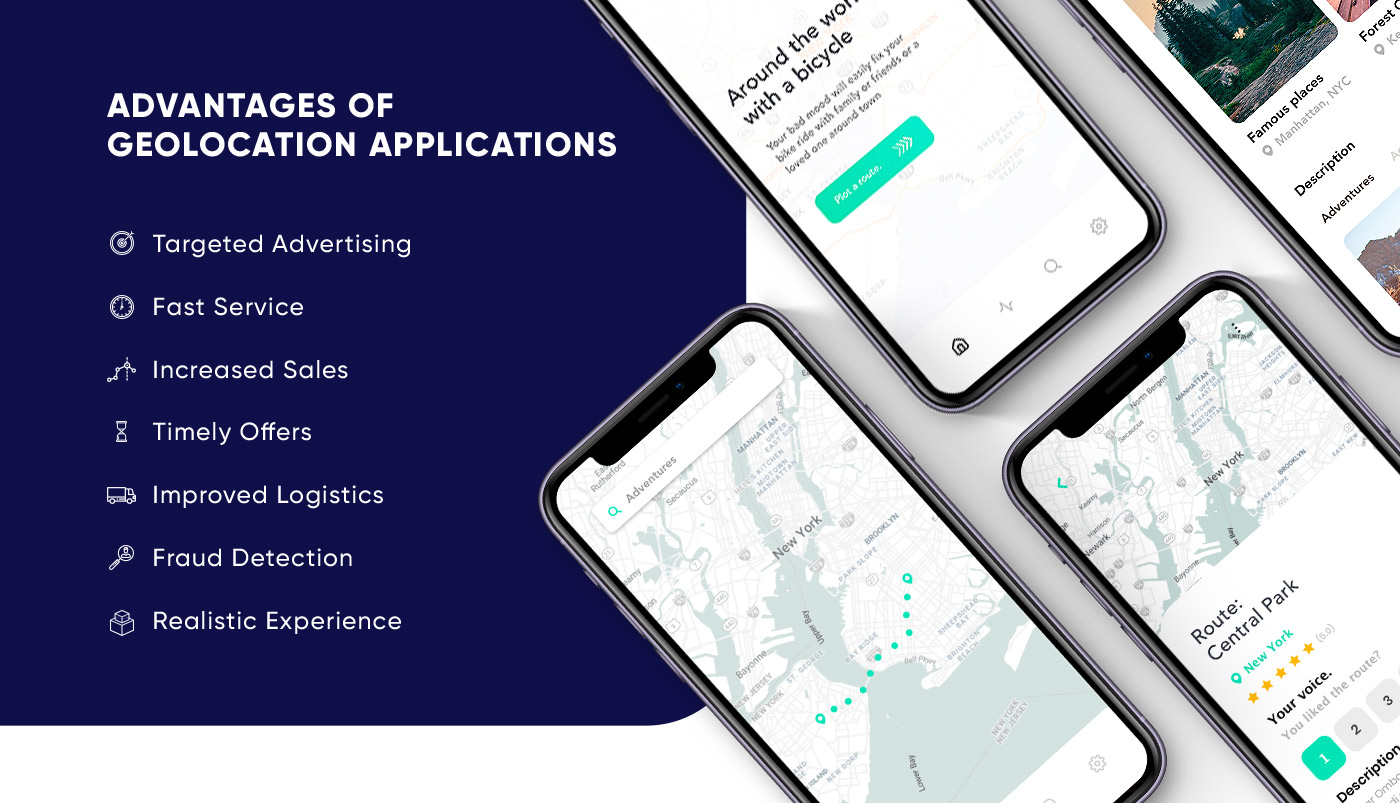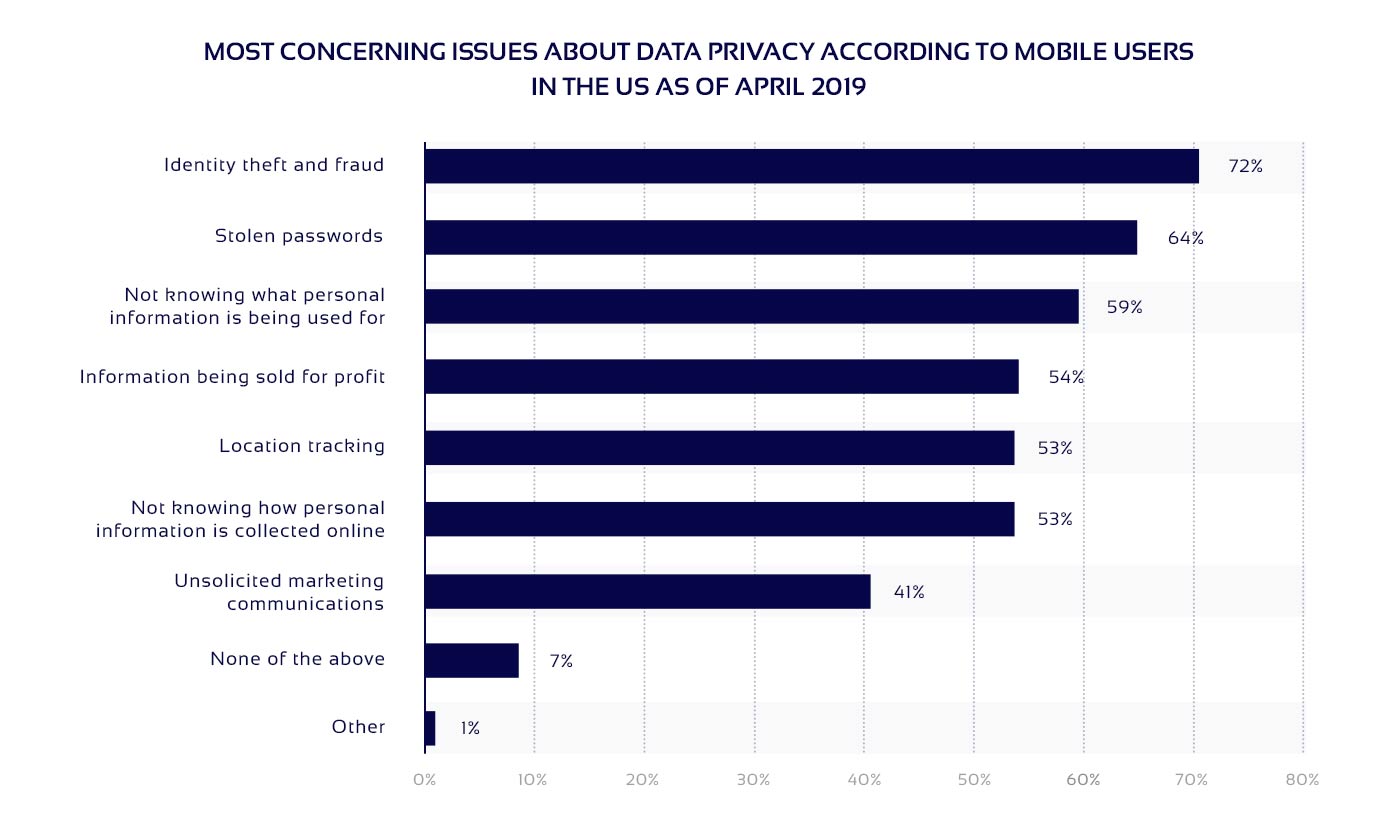The overwhelming popularity of location-based applications is undeniable because almost any app on our phones uses geolocation to a greater or lesser extent. These apps have become something more than mapping or navigation tools for modern society. They cover almost any aspect of our lives – from household activities and product consumption to communication or even love life.
Such versatility makes a solid ground for a successful business, allowing entrepreneurs to reshape customer consuming behavior to their benefit, increase brand loyalty, and optimize processes within companies. Still, the creation of a location-based app has its traps and pitfalls. Security issues might be challenging, so business owners always need expert help if they want to build this type of app. Besides, geolocation is a battery-consuming feature, so it must be implemented thoughtfully to make user experience as convenient as possible. This article will tell you how location-based app development is beneficial and what it takes to make a mobile software product with a geo functionality.
Location-Based Services in Figures
A location-based application is a type of mobile app that provides users with various services based on their location data. The idea of detecting a mobile device on the map via a global positioning system, cell towers, and Wi-Fi transformed into a plethora of advanced software products. They make our lives easier and improve the quality and speed of work in companies. According to the 2019 survey by Lawless Research, marketing specialists effectively use location data to promote products and services at their organizations.

These figures show that advertising and marketing campaigns based on location data usage proved their high efficiency for business. No wonder that early technology adopters such as Uber, Foursquare, Walmart, or even Tinder keep making much profit out of geolocation technologies. Now, let’s see how developing a location-based app is beneficial for startups, mid-sized, and mature companies.
Business Advantages of Geolocation Apps
Many companies use geolocation apps both internally and externally. The first way is to synchronize them with the company’s systems for reasonable resource and effort management. The second way is to create an app for customers. These apps help to promote products or services, make them more accessible and attractive to people, and outrun competitors. Below, you can see a full list of location-based apps business benefits.

Targeted Advertising
By knowing users’ geolocation data, online and offline businesses can create mobile advertisements for the audience based in a particular area. This is a powerful strategy for attracting new customers by offering them area-specific content, for instance, about seasonal products for climate-dependent places and year-round propositions on a more global scale.
Fast Service
Geolocation applications provide businesses with an advantage over competitors in terms of service. They work in a way to estimate and define the shortest path and time to arrive at the client’s destination. As an example, driving services like Uber take the best out of location systems to connect passengers with drivers faster and ensure a comfortable ride. Another example is the Starbucks app that allows customers passing nearby the offline coffee shop to make an order ahead-of-time and have it ready when they enter the shop.
Increased Sales
By consent of users, GPS apps collect data about the company’s customers to improve their consumer experience. They can also serve as a part of IoT systems that allow companies to study customers and understand their buying behavior. For example, a combination of GPS and motion sensors in the physical stores let managers watch how clients move and where they stop more frequently. As a result, retail business owners can place goods in the most efficient order at their stores to increase sales.
Timely Offers
Location-based apps help to make the customer experience more personalized. Retail businesses, restaurants, and entertainment are among the most active industries that use the advantages of geolocation apps in full. Every time their customers pass by the physical business location, a mobile app sends them notifications about special offers, recommendations, personal discounts, etc. to urge them to visit this place.
Improved Logistics
Location-based apps help various companies with logistics and asset management. They allow monitoring the required supplies from the pickup stage to the very arrival of materials at the destination. You can also control the speed of deliveries and the cost of fuel by using the app for smart route planning.
Fraud Detection
The location tracking functionality allows users and businesses to detect and prevent fraudulent actions towards their products, services, and private data. It is a widely used technology at banks and rental services. In case of emergency, such apps help to locate credit cards, find out where suspicious transactions came from, detect a lost or stolen rented product, etc.
Realistic Experience
Various businesses must continuously invent new ways of winning people’s hearts and rising above competitors. By using a geolocation app and the powers of augmented reality, you can sell your products by offering a realistic user experience to customers. Augmented reality might be a costly technology for startups. However, as soon as their business matures, its implementation will ensure unthinkable sales growth. As an example, mobile games like Pokémon GO or Temple Treasure Hunt help their creators earn a lot of money out of geo-based features and augmented reality.
How to Make a Location-Based App?
Companies that already use the advantages of geo-based mobile apps make higher profits than their competitors who only plan to promote their services locally and globally. However, before starting geolocation app development, business owners must focus on:
- The type of application that will suit the company’s business needs;
- Technologies to build a location-based app considering the end goal and budget;
- Legal aspects of location data collection, usage, and privacy;
- Budget planning based on current prices for app creation.
Types of Geolocation Apps
There’s a wide range of applications that use the advantages of geolocation. If you have yet to define the concept of your application, here’s a list of ideas for your potential location-based app:
- On-demand services;
- Shopping apps;
- Travel applications;
- Recommendation engines;
- Reservation and booking apps;
- Healthcare and fitness apps;
- Social media networks;
- Navigation apps;
- Dating applications;
- Mobile gaming;
- Mobile banking, etc.
Retail and on-demand services that include delivery, ridesharing, transportation, and home service are the most profitable and, consequently, most competitive niches. They put geolocation functionality in the first place compared to other apps on the list. The other apps require geolocation only as an auxiliary functionality.
Choice of Mobile Technologies
If business owners have already established the idea for an application, they must select one of the two options to start making it real. These options are:
- Native development. When creating a native app, specialists use only official programming languages, libraries, and frameworks for iOS or Android development. So, you would need Kotlin or Java specialists to create a separate Android app and Swift or Objective-C programmers to develop an application for iOS. The cost of native technologies is higher than that of the hybrid ones. At the same time, using only official resources makes the quality of apps exceptional and provides specialists with higher flexibility and freedom to implement more features.
- Hybrid development. One of the most popular alternatives to native technologies is React Native. It allows building one application for both Android and iOS platforms instead of using one native technology per each mobile platform. Hybrid technologies are more cost-friendly compared to the native ones. Still, the performance of React Native apps might not be as smooth as that of a native solution.
The most common stack of geolocation features usually includes:
- Map integration;
- Location detection;
- Routing search;
- GPS tracking;
- Third-party integrations (such as Google Analytics), etc.
Making these integrations is possible by using geolocation service packages that go along with native technologies. Mobile developers implement location features in hybrid solutions by using React Native APIs and third-party open-source libraries that help to build an application faster.
Location-Based App Design
If you need a native application, the design process would run faster because specialists work with a single mobile OS and platform-specific tools. If you choose hybrid development to cover both iOS and Android platforms simultaneously, the challenge that you might face is the differences in interfaces, animation, and map components between these operating systems.
Developers who work with hybrid technologies have all the necessary tools to build a convenient UI for each mobile platform. Independently or in cooperation with a designer, they can easily create a location-based solution from scratch. To figure out the time to design an app with a geolocation functionality, let’s see the example of Yelp.
Yelp is a reviews and recommendations app that covers a plethora of industries, including retail, beauty, restaurants, healthcare, etc. and serves for a big user audience. Its functionalities include:
- User accounts;
- Reviews and rating system;
- Social media login integration;
- Push notifications;
- Geolocation;
- Analytics system for businesses.
The geolocation features of this app allow users to find the most interesting places and services near them. It’s also a platform that helps small, mid-sized, and large corporations to promote their products or services and get continuous feedback from their customers.
The approximate time to design a similar application would be:
- Wireframing and UI design - 375h;
- UX design - 200h.
The overall time of development would cover:
- Business analysis - 250h;
- Project management - 650h;
- UI development: iOS - 985h, Android - 1000h (overlaps with the design process);
- React Native development - 1020h;
- Security testing and quality assurance - 280h.
Location Data and Security
Some companies and users are cautious about sharing their location data because of possible confidentiality breaches. According to the survey by Statista, more than 50% of respondents consider the location tracking functionality to be a threat to their privacy.

The security of corporate and user data must be a top priority from the very start of development. Companies that underestimate the security measures risk to reveal their private data to fraudsters or competitors. If synchronized with corporate systems, location-based apps must guarantee no data leaks on the business level. If an entrepreneur wants to create a customer-centered app, they must know the intricacies of legal aspects of user privacy. To ensure legal data protection, business owners must rely on these principles:
1. Security Testing
Entrepreneurs must not neglect the importance of mobile app testing, especially if geolocation features are an essential part of the application. This type of testing requires deep expert knowledge and careful planning, so make sure that your development team has enough expertise at building location apps.
Hackers can attempt to intercept user data the moment it’s being sent to the server or hack the server to access user databases. So, providing high security of the server is a top priority for developers. Testing of geolocation apps is also challenging and time-consuming because specialists must imitate the user path on a map to achieve the app’s stability, which is possible by using advanced testing tools.
Also, penetration tests let QA experts simulate attacks by malware and hackers to eliminate any vulnerabilities of a product. As a result, clients get a solution that is safe to use and complies with the data protection law within the country of residence.
2. Transparency
Transparency is the foundation of trust between companies and their clients. To make users trust your services, they must know how the application collects and uses their location data. The goal of any application is providing quality services that would increase client loyalty. Your app must present a detailed Privacy Policy and Terms & Conditions, in which your users will find out how the collected data can help the app work for your client’s benefit. It’s important to guarantee that this data will not be shared with third parties or sold for profit.
3. User Permissions
The time when your app asks user permissions matters. When users open the application, they need to understand the whole range of its functions before permitting the system to use data on their phones. If a system asks for permissions when a user has just opened an app, it might cause a mistrust. The more relevant strategy would be to request personal data and location only when an app is about to offer users to make a location-related action.
Users may also decide to decline permission for their location data. In this case, they won’t be able to use the app to the fullest extent, that’s why it’s essential to explain why and how the application will collect this data and guarantee its highest security, as described in paragraph 2 of this list.
How Much Does It Cost to Create a Geolocation Application?
The answer to this question isn’t straightforward because everything depends on the specifics of your project. Previously on our blog, we provided a detailed overview of prices for mobile app development and factors that influence them. On the overall, the cost of location-based app development depends on several factors, including:
- the location of a development team;
- the number of specialists in a team and their experience;
- the mobile platform you target;
- the choice of programming technologies;
- the complexity of an application;
- the cost of quality assurance;
- the price for additional services, if required: business analysis, consulting, design, post-production maintenance, etc.
The total cost of creating a geo-based mobile app also varies depending on the specialists who work on your application – be it a freelancer or a software engineering company – and the type of contract that both sides agreed to follow.
Conclusion
By building a location-based application for your business, you get numerous advantages that help to outpace your competitors by service, sales, and customer satisfaction. Whether you want to put geolocation as the main feature in your system or use it as an auxiliary technology to expand the capabilities of the application, an experienced development team will help you achieve the desired result with native or hybrid technologies. The time and cost to make a geo-based application depend on the peculiarities of your project. If you want to make your idea real, contact us, get an estimation of your project, and achieve the best result with our help.




